A1727
Alkaline Hypochlorite solution
Synonyme(s) :
Hypochlorite, Sodium Hypochlorite
Se connecterpour consulter vos tarifs contractuels et ceux de votre entreprise/organisme
About This Item
Code UNSPSC :
12352106
Nomenclature NACRES :
NA.25
Produits recommandés
Forme
liquid
Température de stockage
2-8°C
Application
Alkaline Hypochlorite solution is used as an oxidizing and bleaching agent with activity as a discolorant.
Composants
0.2% sodium hypochlorite in alkali solution
Clause de non-responsabilité
The product is not intended for use as a biocide under global biocide regulations, including but not limited to US EPA′s Federal Insecticide Fungicide and Rodenticide Act, European Biocidal Products Regulation, Canada’s Pest Management Regulatory Agency, Turkey’s Biocidal Products Regulation, Korea’s Consumer Chemical Products and Biocide Safety Management Act (K-BPR) and others.
Mention d'avertissement
Danger
Mentions de danger
Classification des risques
Eye Dam. 1 - Met. Corr. 1 - Skin Corr. 1B
Code de la classe de stockage
8B - Non-combustible corrosive hazardous materials
Classe de danger pour l'eau (WGK)
WGK 1
Point d'éclair (°F)
Not applicable
Point d'éclair (°C)
Not applicable
Certificats d'analyse (COA)
Recherchez un Certificats d'analyse (COA) en saisissant le numéro de lot du produit. Les numéros de lot figurent sur l'étiquette du produit après les mots "Lot" ou "Batch".
Déjà en possession de ce produit ?
Retrouvez la documentation relative aux produits que vous avez récemment achetés dans la Bibliothèque de documents.
S Haenni et al.
International endodontic journal, 36(2), 100-105 (2003-03-27)
Chemical and antimicrobial effects of paste-like suspensions of calcium hydroxide (Ca(OH)2) powder with chlorhexidine (CHx), sodium hypochlorite (NaOCl) or iodine potassium iodide (IPI) solutions were tested and compared to conventional Ca(OH)2/saline paste. Equivalent mixtures of Ca(OH)2 with irrigating solutions were
D M Taylor et al.
Archives of virology, 139(3-4), 313-326 (1994-01-01)
Macerates of bovine brain infected with bovine spongiform encephalopathy (BSE) agent, and rodent brain infected with the 263K or ME7 strains of scrapie agent, were subjected to porous-load autoclaving at temperatures between 134 and 138 degrees C for < or
Karin Lemmer et al.
The Journal of general virology, 85(Pt 12), 3805-3816 (2004-11-24)
Effective reprocessing of surgical instruments ensuring elimination of inadvertent contamination with infectious agents causing transmissible spongiform encephalopathies (TSEs) is essential for the prevention of iatrogenic transmission of Creutzfeldt-Jakob disease (CJD) or its new variant (vCJD) from asymptomatic carriers. In a
Suzanne Z Andersen et al.
Nature, 570(7762), 504-508 (2019-05-23)
The electrochemical synthesis of ammonia from nitrogen under mild conditions using renewable electricity is an attractive alternative1-4 to the energy-intensive Haber-Bosch process, which dominates industrial ammonia production. However, there are considerable scientific and technical challenges5,6 facing the electrochemical alternative, and
Byung Hee Ko et al.
Nature communications, 11(1), 5856-5856 (2020-11-19)
The electroreduction of carbon dioxide offers a promising avenue to produce valuable fuels and chemicals using greenhouse gas carbon dioxide as the carbon feedstock. Because industrial carbon dioxide point sources often contain numerous contaminants, such as nitrogen oxides, understanding the
Notre équipe de scientifiques dispose d'une expérience dans tous les secteurs de la recherche, notamment en sciences de la vie, science des matériaux, synthèse chimique, chromatographie, analyse et dans de nombreux autres domaines..
Contacter notre Service technique






